
At the time, the public was still reeling from the revelations disclosed by NSA whistleblower and private intelligence employee of Booze Allen Hamilton Edward Snowden. We learned of the NSA's sophisticated and widespread data collection of ordinary American citizen communications. The cat was out of the bag. From phone calls, to texts, to emails, browsing history and social media activities - nothing was off limits.
"Collect It All"
was, and in all probability still is, the mantra of the nation's largest intelligence agency. Despite what legacy media institutions would like us to believe. A recent headline from the NY Times proclaimed: NSA Phone Records Program Shut Down.
When Edward Snowden met with Glenn Greenwald (then with the Guardian) and Laura Poitras in Hong Kong he provided them with a substantial archive of NSA files detailing the mass surveillance on the American public. Snowden maintained that he felt it was his patriotic duty to inform the citizens of the US about the extent of domestic data collection.
Greenwald shared the NSA archive with prominent publishers including the New York Times, Washington Post and his then publisher the Guardian. Week after week, stories deriving from the contents of the archive were slowly 'dripped' to the public from these publishers. The revelations were unprecedented revealing NSA programs such as XKeyScore.
• XKeyscore gives 'widest-reaching' collection of online data
• NSA analysts require no prior authorization for searches
• Sweeps up emails, social media activity and browsing history
With each new disclosure from the Snowden archive pressure was mounting on the media organizations who were running stories on the NSA's clandestine operations. However mainstream media attention quickly evaporated. The NY Times, WaPo and even the Guardian stopped publishing the material.
The Intercept and Omidyar's online media empire was soon launched with much fanfare and many believed that the Intercept would be the new home of the NSA files and would focus resources allowing for the continue release of documents and further disclosures to the public on illegal government surveillance.
It's true that the Intercept has continued to release portions of the archive over the last 5 years and has continued reporting but the vast majority of the archive, an estimated 90% still remains unavailable to the public.
This has lead some to suggest that the Intercept and First Look Media have been actively withholding the archive and rather than making the contents known to the public, the organization acts as a sort of custodian or even gatekeeper to the Snowden files.
Defunding the Archive
March 13 2019
An internal all-staff email from First Look Media CEO Michael Bloom reveled that the organization would no longer fund the Snowden Files. It was an "agonizing" but necessary decision based on the amount of resources FLM has spent on maintaining the collection.
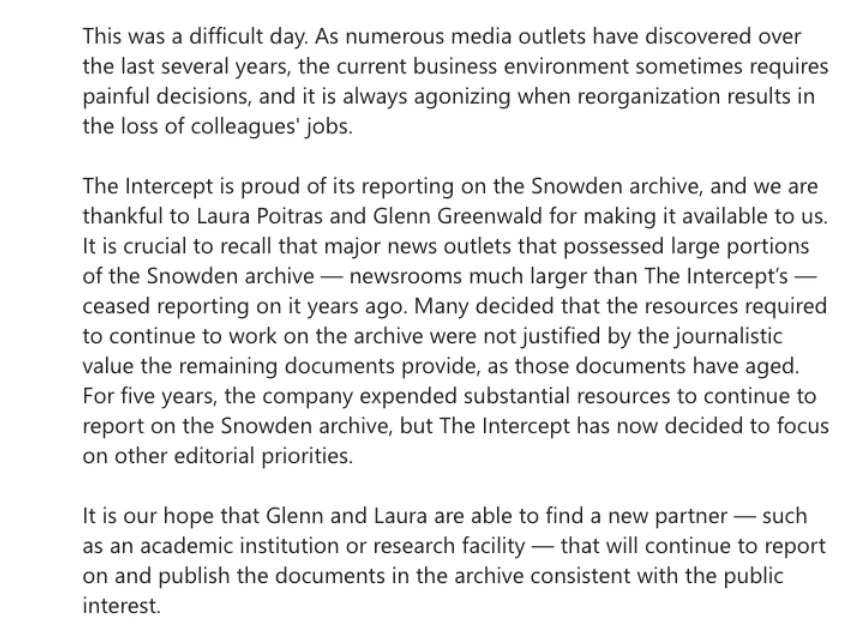
In response to the surprise announcement, an outraged Laura Poitras said she was "sickened" by the decision made by the top brass at FLM without bothering to consult wtih the board of directors.
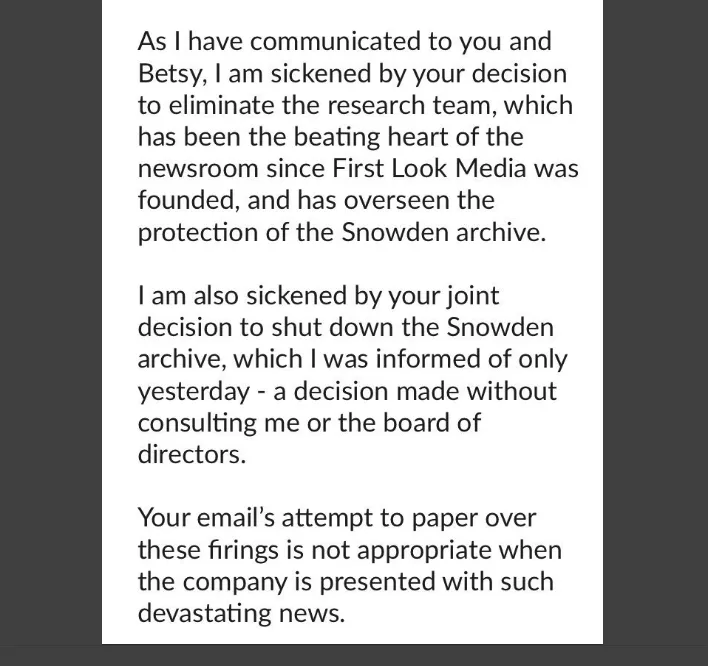
Journalist Alex Rubinstein cut to the heart of the matter suggesting the decision may have come from Omidyar and that it was a major setback in the field of investigative journalism.
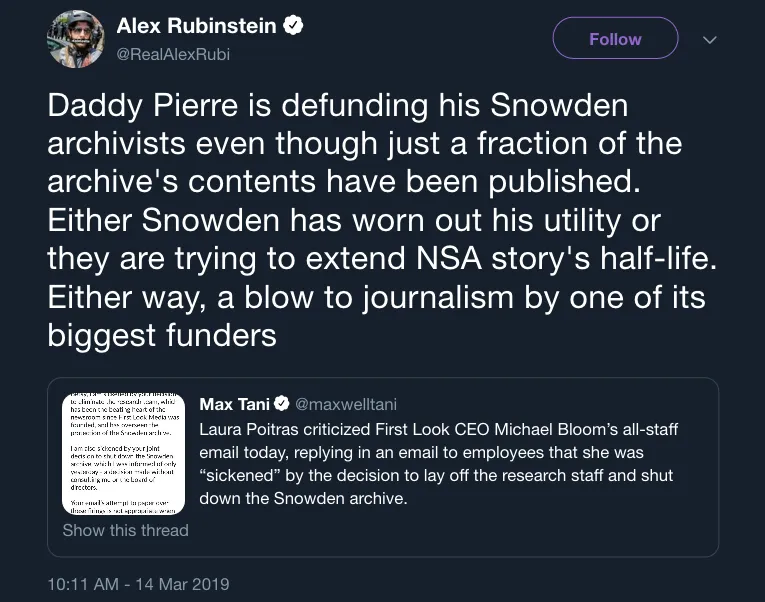
According to the email, First Look Media justified the decision due to lack of resources and was laying off the research staff involved in the project. This comes as a surprise as Omidyar seems to be expanding his online media empire but apparently funding the Snowden archive is no longer a priority.
It begs the question: Was it ever a priority?
Information Gatekeepers?
Since news of the defunding of the Snowden archives broke people have been anxious to hear from Greenwald who was first to publish the information provided by Snowden back in 2013.
Greenwald maintains that both he and Poitras still possess copies of the full archive and are actively looking for a suitable partnership to house and safeguard the files.
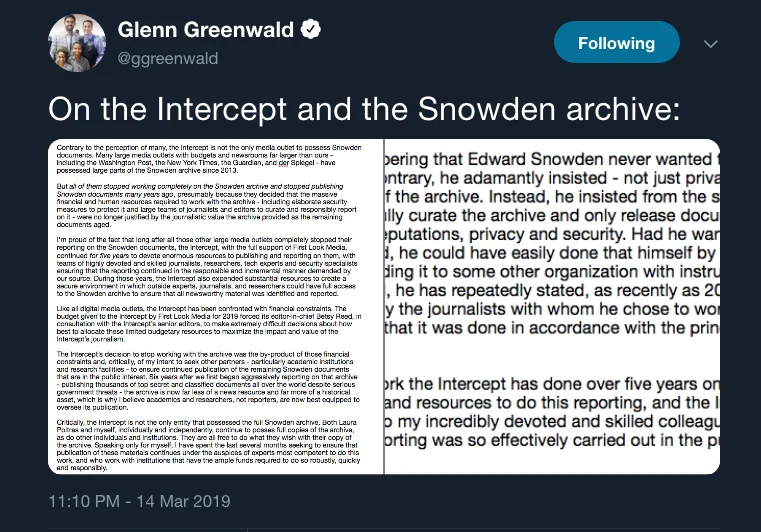
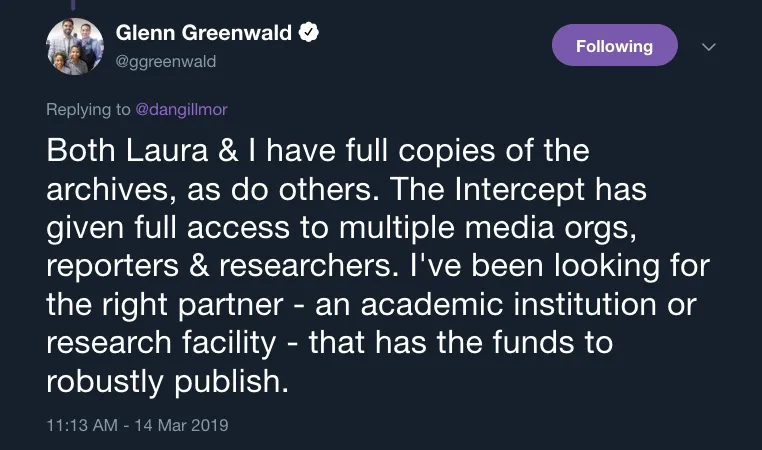
While some may take comfort that Greenwald and Poitras still have the archives others are openly questioning why the Intercept has not produced more results over the last five years considering that it does (did) have a research team and the backing of a billionaire.
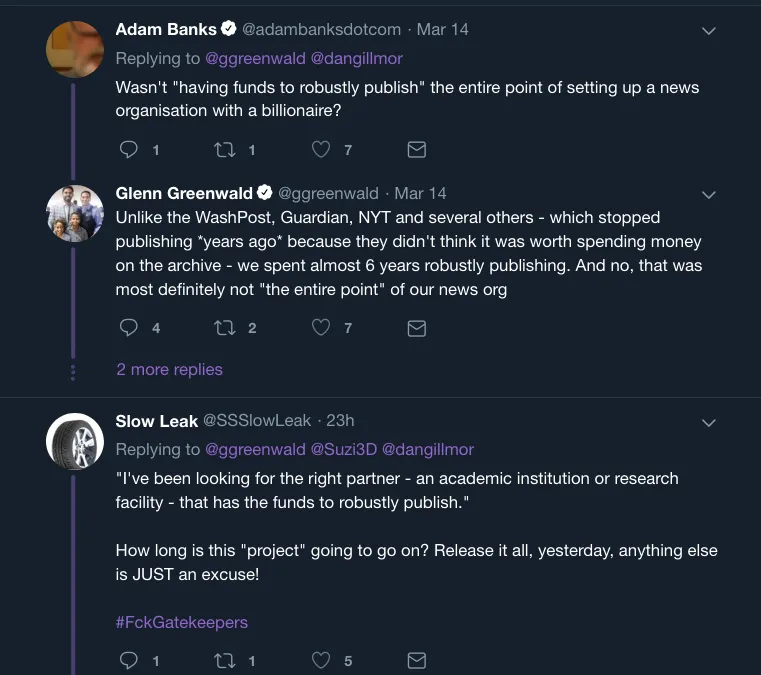
Piling on criticism, some took to Twitter to demand that the full archive be made public and rehashing a claim that Glenn Greenwald himself is acting as a gatekeeper preventing access to the public.
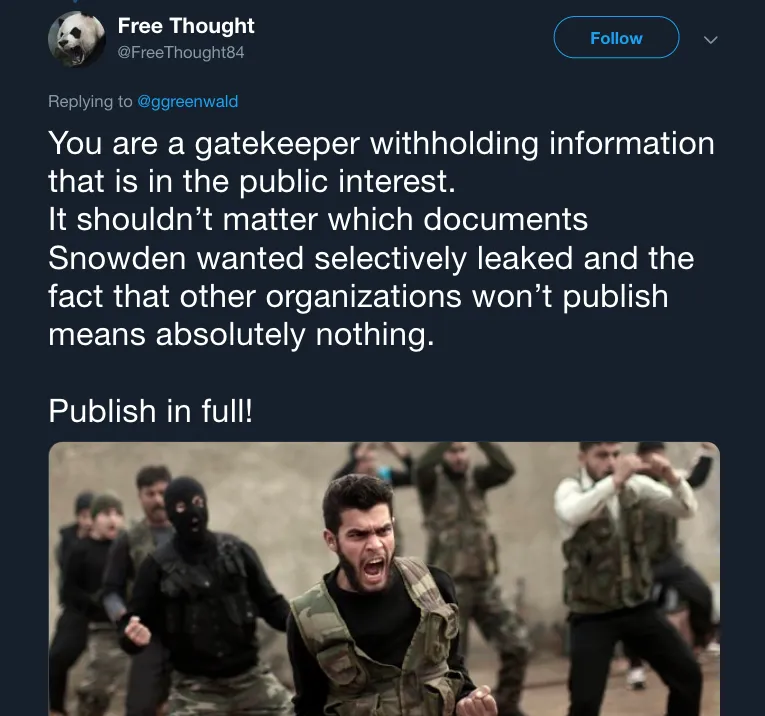
Greenwald adamantly defended the journalistic practices of the Intercept citing safety concerns that could seriously damage the lives of individuals named in the collection.
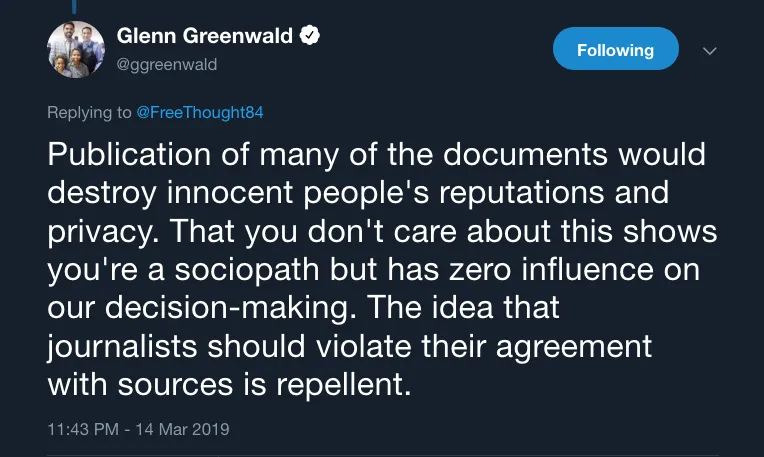
However, as pointed out by Mint Press News reporters:
The Intercept’s Greenwald pledged in 2014 to build a secure “reading room” where outside journalists could review files at the publication’s New York City office. That room has not materialized.
Source
More criticism:
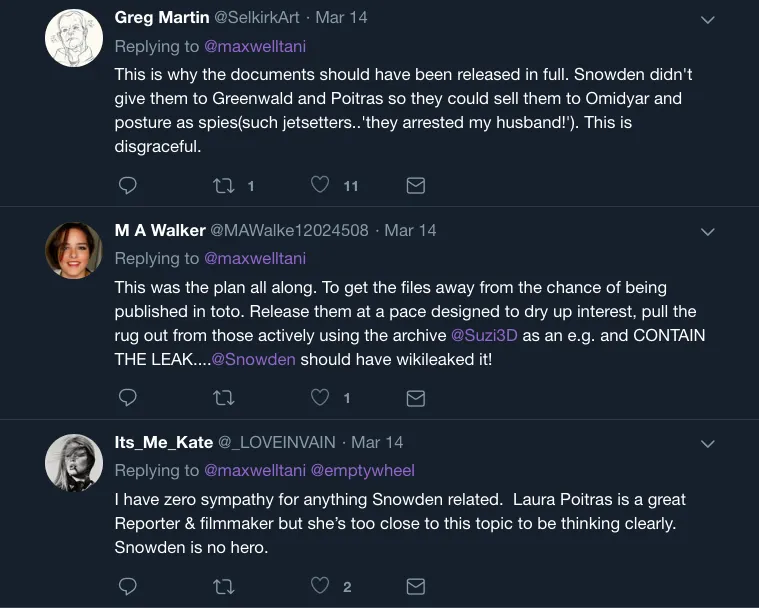
Some even suggested that the archives would find a better home if passed on to the whistelblowing site Wikileaks.
Journalist Suzie Dawson (@suzi3d), who has conducted extensive research into the publicly available Snowden archive with her Decipher You series tweeted that she too was dismayed by the decision to defund the project reiterating that the archive remains as relevant today as it was 5 years ago.
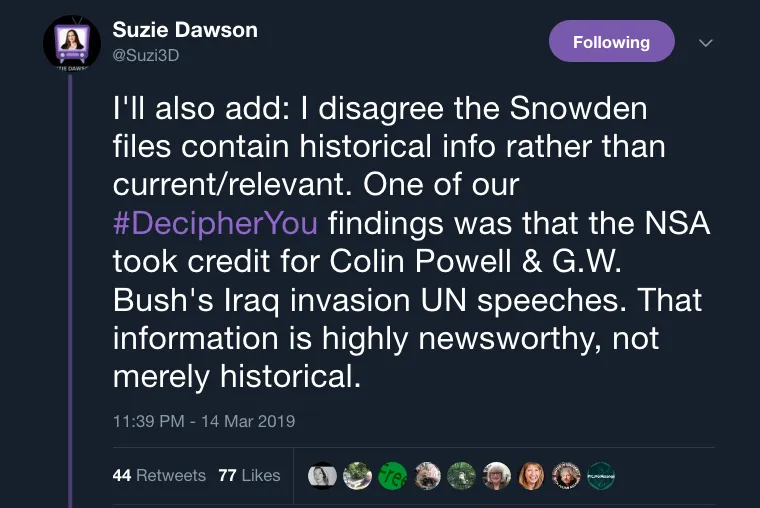
Dawson has vowed to renew the Decipher You research in earnest following the decision by FLM.
The Wikileaks Twitter account also weighed in on the news with a tweet highlighting the fact that 90% of the archive is still in private hands.

Omidyar GateKeeper
Omidyar remains an elusive and reclusive figure in the public realm, a man who goes to great lengths to preserve his personal privacy. Omidyar spends most of his time away from the US mainland preferring to conduct business empire from the comfort of his Hawaiian home. Omidyar is so reclusive that he invested 300,000K into the Second Life virtual world in the early years. To this day, some of Omidyar's business partners have only met his avatar within the Second Life virtual landscape.


In recent years the reclusive billionaire has quietly expanded his online media empire with a complex web of interconnected internet holdings that have also greatly increased his online influence well beyond FLM and the intercept.
According to crunchbase.com, the ON network has invested hundreds of millions into a wide range of startups that consist of 175 subsidiary companies. The Omidyar Network is essentially an investment firm.
https://www.crunchbase.com/hub/omidyar-network-portfolio-companies#section-overview
Omidyar recently tweeted about NewsGuard, the dubious fact checking rating system being rolled out by Microsoft.
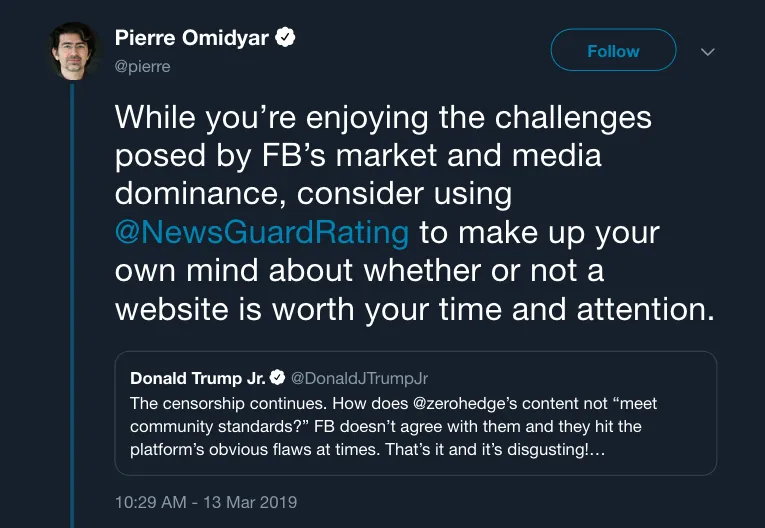
In 2017, Omidyar provided 100 million to fight hate speech and to support of investigative journalism.
With so many investments in a plethora of internet startups it's hard to believe that Omidyar's company is hard-pressed to find the resources needed to keep the Snowden Archive afloat.
So we have to ask the question once again - Was reporting on the Snowden archive really the driving force behind the creation of the Intercept as stated in their introductory press release?
Our short-term mission is limited but critically important: to provide a platform and an editorial structure in which to aggressively report on the disclosures provided to us by our source, NSA whistleblower Edward Snowden. We decided to launch now because we believe we have a vital and urgent obligation to this story, to these documents, and to the public.
Or did Omidyar essentially privatize the archive as part of a plan to slowly close the door on NSA files?
For an in depth analysis of Pierre Omidyar, I highly recommend reading a recent article by Alex Rubinstein and Max Blumenthal for Mint Press News.
Ebay Founder Pierre Omidyar is Funding a Global Media Information War
Omidyar A Billionaire Prone to Reclusiveness and His Trove of State Surveillance Secrets
https://www.rt.com/news/453842-snowden-archive-shut-intercept/

